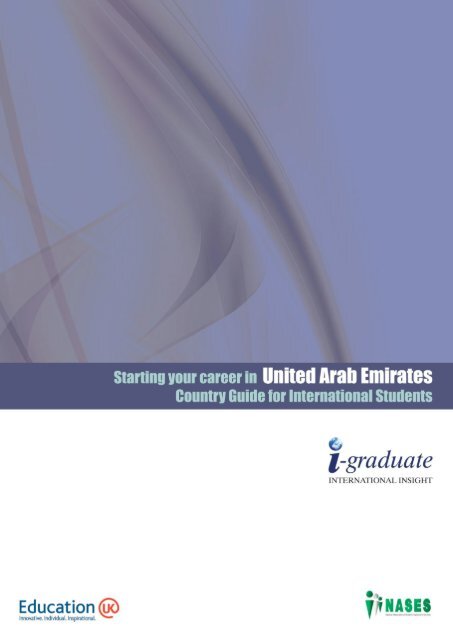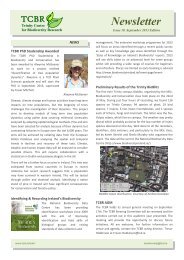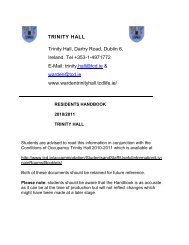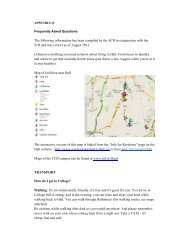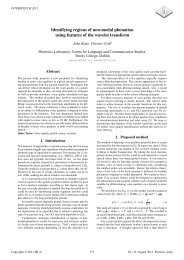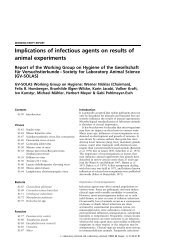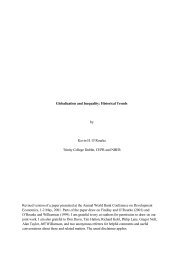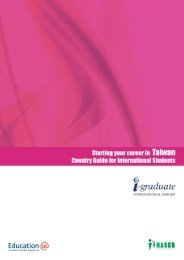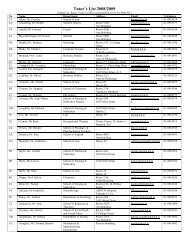United Arab Emirates - AGCAS
United Arab Emirates - AGCAS
United Arab Emirates - AGCAS
Create successful ePaper yourself
Turn your PDF publications into a flip-book with our unique Google optimized e-Paper software.
You chose to study in the <strong>United</strong> Kingdom. You are<br />
beginning to think about what your options are after<br />
graduation. Building on an excellent international<br />
education you are returning to your home country, the<br />
<strong>United</strong> <strong>Arab</strong> <strong>Emirates</strong> (UAE). You stand at the beginning<br />
of an exciting career, but what are the steps you need<br />
to take in order to find a suitable job, and where do<br />
you find the information you need?<br />
This careers profile provides you with practical<br />
advice about returning to work in the UAE to help you<br />
make a successful start in your career in the UAE<br />
labour market. Included are key facts about current<br />
trends and jobs in UAE industry, advice about seeking<br />
employment in the UAE, hints and tips for making a<br />
successful application, and helpful information<br />
sources.<br />
Country profile<br />
Benefits<br />
Main routes to employment<br />
Where will your career take you?<br />
Current career prospects<br />
Where to find more information<br />
Appendix 1: CV
2<br />
Country profile<br />
With a prospering free-market economy, the <strong>United</strong> <strong>Arab</strong> <strong>Emirates</strong> ranks amongst the most<br />
developed nations both regionally as well as globally. As dropping oil prices have had a<br />
negative effect on government revenue in the past, the government has recently begun to<br />
pursue a policy of economic diversification with the aim of reducing the reliance on oil. This,<br />
alongside the incorporation of more UAE nationals into the labour market, is challenging the<br />
sustainability of the Gulf economy. In the years to come, the national education sector will<br />
need to be reinforced, whilst employment is expected to shift towards an increase in the private<br />
sector.<br />
KEY FACTS: The economy of the UAE<br />
GDP real growth 2010:<br />
GDP per capita:<br />
Labour force:<br />
Unemployment rate:<br />
Major sectors of occupation:<br />
Main trading partners:<br />
2% (2010 est.)<br />
US$49,995 (2010 est.)<br />
3.168 million (2010 est.)<br />
4% (2010 est.)<br />
Oil and gas, petrochemicals, manufacturing, construction,<br />
shipping, tourism, retail, telecommunications<br />
China, Japan, India, USA, UK, Germany, Italy, South<br />
Korea, Thailand<br />
Initial steps to restructure the UAE’s economy have proven successful. Free trade zones have<br />
been attracting foreign investment throughout the recent decades. The national industries<br />
developed further and ports have turned into trade centres, while land reclamation has made<br />
the import of vegetables and fruit largely superfluous.<br />
KEY FACTS: The UAE’s graduate labour market<br />
Average age at graduation:<br />
Average graduate starting salary:<br />
Average working week:<br />
Holiday entitlement:<br />
22-24 years<br />
US$15,000 (per month and tax free)<br />
5 days a week, Sunday to Thursday, 48 hours (full-time,<br />
reduced during Ramadan)<br />
21 days (additionally 20-30 days of unpaid leave for<br />
pilgrimage)
Benefits<br />
Benefits of a UK qualification<br />
Possibly the largest benefit which all international students receive when studying at one of the<br />
over 100 universities in the UK, is the fact that UK universities have some of the most<br />
renowned and prestigious histories of higher education in the world. Even if a graduate does<br />
not study at one of the more famous institutions, the graduate can return to their home country<br />
safe in the knowledge that no matter where they look for work, their qualifications will be highly<br />
respected. This is also useful in job interview situations, in which your study in the UK can<br />
come into conversation as a point of interest and as an example of experience in situations of<br />
teamwork, cultural awareness, when possibly you were outside of your comfort zone.<br />
Furthermore, your experiences in writing and reading English are extremely valuable in the job<br />
market. As an added benefit, you will no doubt have been exposed to a variety of accents and<br />
dialects during your study stay, making you more open to the English language than you may<br />
have realised.<br />
Graduating: Searching for work<br />
Not long ago, student life and job finding was a far simpler procedure. Graduates would simply<br />
leave university, either looking for work through friends and family, a large company or a local<br />
business, and often step into a full-time job after an interview. These days, a wider variety of<br />
options exist which match the wider variety of jobs and the ease of travel which is available to<br />
the worldly student. As the number of students increases, so does the quality of the<br />
competition.<br />
It’s tough out there. Many graduates having just left university know this, whilst others are soon<br />
to find out. Since so many new university leavers have a career path in mind which they may<br />
have had for many years, the competition is fierce in many of the desirable graduate schemes.<br />
This is more the case in the UK then almost anywhere else. However, one benefit which you<br />
as the international student have is that you have a home country to which you can return. The<br />
lack of vacancies in the UK has led to many British students leaving for work further afield,<br />
often with little experience of the language in that country outside of the native English<br />
speaking countries. For example, in China whilst there are some international companies<br />
which accept English-only students, the vast majority will prefer a candidate with some basic<br />
Chinese. If you are returning to your home country with a firm grasp of English as well as your<br />
mother tongue, you already have an advantage.<br />
It can be difficult to come across vacancies in graduate jobs- full-time occupation is hard to find<br />
without experience and most find that internships can involve heavy competition. Most<br />
graduates find that the main issue is simply knowing where to look, and this guide hopes to<br />
point you in the right direction.<br />
Check out the ‘More Information’ section to see handy links with tips and advice in the search<br />
for work.<br />
3
4<br />
Main routes to employment<br />
Getting started<br />
As a graduate looking for work in the <strong>United</strong> <strong>Arab</strong> <strong>Emirates</strong>, you should use a variety of<br />
strategies. Newspapers are a helpful starting point when it comes to the job-hunt, but using the<br />
Internet to advertise vacancies is becoming more common.<br />
When searching the Internet for job offers and vacancies, it is advisable to bookmark<br />
webpages and re-visit them regularly. Make use of email alert services offered by online<br />
resources to stay updated with the newest jobs.<br />
Online recruitment and vacancy websites:<br />
AME info: www.ameinfo.com/<br />
Bayt: www.bayt.com/<br />
Career Gate: www.careergate.ae/<br />
Career Middle East: www.careermideast.com/en/default.aspx<br />
Ershaad: www.ershaad.ae/<br />
<strong>Emirates</strong> group careers: www.emiratesgroupcareers.com/english/<br />
Gulf Talent: www.gulftalent.com/home/index.php<br />
Gulf jobsites: www.gulfjobsites.com/<br />
International Business Women’s Group: www.Ibwgdubai.com<br />
Monster Jobs: www.monstergulf.com/<br />
Naukriguld: www.naukrigulf.com/<br />
Ten jobs: www.tenjobs.com/<br />
The National Human Resource Development and Employment Authority<br />
www.tanmia.ae/tanmia/general/index_new.aspx<br />
UAE Graduate: www.uaegraduate.com/ver2.php<br />
Social networking<br />
Social networking has become an increasingly common and important part of seeking work,<br />
especially with the social media generation. Sites such as Facebook.com and LinkedIn.com<br />
have flourished into everyday use for graduates and employers alike, in order to find the right<br />
person for the job. Graduates looking for work in their home nation may already be aware of<br />
the value of such sites, and of specific sites which are specialised in their own country.<br />
Graduates can place details of themselves including their job experience, education level,<br />
home/current university as well as a photo if preferred. On some of these sights you can also<br />
search for jobs according to their specific interest or area of study. What is clear is that<br />
graduates should certainly take the time to discover the potential job opportunities which these<br />
sites offer, both socially and at a socio-professional level.
5<br />
Main routes to employment<br />
The following list of examples is not exhaustive, and contains websites with varying emphasis<br />
on professionalism and social networking.<br />
Sites worth checking out (global):<br />
<br />
<br />
<br />
<br />
<br />
<br />
<br />
<br />
<br />
www.ecademy.com<br />
www.efactor.com<br />
www.facebook.com<br />
www.LinkedIn.com<br />
www.myspace.com<br />
www.plaxo.com<br />
www.ryze.com<br />
www.spoke.com<br />
www.ziggs.com<br />
Key newspapers to look for:<br />
<br />
<br />
Gulf News<br />
Khaleej Times<br />
Online newspaper sites in English:<br />
<strong>Arab</strong>ian Business: www.arabianbusiness.com<br />
Dubai Chronicle: www.dubaichronicle.com<br />
Emarat Business: www.emaratbusiness.com<br />
The National: www.thenational.ae<br />
Many vacancies are not advertised in newspapers or on job websites. Therefore, the use of<br />
alternative sources, persistency and well developed detection skills will help you to discover<br />
the hidden jobs.<br />
When looking for a job, it is important to extend your network of contacts. Let not only your<br />
relatives but also friends, former professors and teachers, neighbours and other acquaintances<br />
know that you are searching for a job and tell them what kind of job or position you are looking<br />
for.<br />
Don’t just wait for the ideal vacancy to appear in the newspaper or on a job site. Browse<br />
company websites and look for job openings advertised by organisations’ human resource<br />
departments.
6<br />
Main routes to employment<br />
Graduate jobs/Careers Fairs<br />
An interesting way of finding work or further education is through graduate fairs. With varying<br />
focuses in each event, graduates can find themselves coming face to face with companies of<br />
interest, and may even find interest in something which was not previously considered.<br />
Graduate fairs are also a good opportunity to find out about graduate schemes being offered<br />
by companies and what these entail.<br />
Many fairs offer other facilities such as CV workshops, letter writing tuition and a chance to<br />
network with individuals representing companies of differing sizes and reputations, thus they<br />
can offer a good learning opportunity even if you struggle to find a company suited to you.<br />
Many universities in the UK hold their own fairs near the end of the spring/summer term and<br />
throughout the summer, so it is well worth getting involved early. There may also be fairs in<br />
your home country, whether a national event or a university which is local to you, so keep your<br />
eyes and ears open.<br />
The website www.adipec.com offers help to those seeking graduate schemes and work, whilst<br />
www.usegtours.com/useg_fairs.htm lists some graduate careers fairs available in the Middle<br />
East. Fees are applicable for attendance at careers fairs.<br />
Alternative sources of information on jobs and companies:<br />
Having a recruitment agency assist you can also be a successful strategy. The agency can<br />
mediate between you and the future employer and arrange interviews. Phoning your agent<br />
regularly and getting acquainted will eventually benefit your job search.<br />
Recruitment agencies:<br />
Aamal Recruitment / Clarendon Parker (Abu Dhabi, Dubai)<br />
www.claredonparker.com/new/pages/aamalae.asp<br />
Al Hamed Enterprises, EMASCO (Abu Dhabi, Dubai) www.alhamed.com<br />
Bayt (online recruitment and career guidance) www.bayt.com/<br />
First Select (Abu Dhabi, Dubai, Ajman) www.firstselectinternational.com/<br />
Gulf Talent (Dubai) www.gulftalent.com/home/index.php<br />
iQ Selection (Dubai) www.iqselection.com/content/default.aspx<br />
Kershaw Leonard (Middle East) http://www.kershawleonard.net/<br />
Nadia Recruitment (Abu Dhabi, Dubai, Sharjah) www.nadia-me.com/<br />
Recruit Gulf, recruitment and career advice (Abu Dhabi, Dubai) www.recruitgulf.com/<br />
Tanmia, National Human Resources Development and Employment Authority<br />
www.tanmia.ae/tanmia/general/index_new.aspx
7<br />
Main routes to employment<br />
A general word of advice: make sure the job you accept is the job you really want. This is of<br />
course always important, but particularly in the <strong>United</strong> <strong>Arab</strong> <strong>Emirates</strong> where the law aims to<br />
stop employees from job-hopping. The law enables employers to give you a (minimum) six<br />
month ban from working in the <strong>United</strong> <strong>Arab</strong> <strong>Emirates</strong> if you resign from a job. If you accept just<br />
any job, you are likely to end up doing that job for a longer period than initially planned. Only if<br />
your employer is in favour of your resignation will they co-operate to enable you to change jobs<br />
without unnecessary delays.<br />
The right skills and competencies<br />
Growing competition on the labour market demands that your application and your skills<br />
distinguish you from other candidates. It is essential therefore to avoid common mistakes that<br />
might create a negative impression.<br />
Most wanted:<br />
<br />
<br />
<br />
<br />
<br />
<br />
Knowledge of the respective market the applicant intends to work in.<br />
High expertise in (a) particular field(s) of study.<br />
Strong communication and networking skills.<br />
The ability to work in a team.<br />
Management and organisational skills.<br />
Courtesy and respectful behaviour.<br />
©ELM 2010<br />
The application letter<br />
When replying to an advertisement by mail, you should send your typed CV with a photograph<br />
(optional), accompanied by a typed letter explaining why you are the best candidate for the job.<br />
The application letter should emphasise your motivation to work for the specific company. The<br />
aim of your letter is to be offered an invitation for an interview.<br />
It is important that the letter allows the recruiter to see your genuine interest not only in the<br />
respective position, but also in the company. You can usually find specific information about<br />
the company to which you are applying on their corporate website.
8<br />
Main routes to employment<br />
The curriculum vitae (CV)<br />
If you were born a <strong>United</strong> <strong>Arab</strong> <strong>Emirates</strong> citizen, you will be required to indicate this in your CV<br />
under ‘Citizenship/Visa status’. Having recently graduated, you may not necessarily have a lot<br />
of work experience. Nevertheless you should list all activities that have prepared your for the<br />
position in question, such as courses, projects or related research. Also give an overview of<br />
your skills, in particular with regard to IT, languages, management and presentations.<br />
Digital applications<br />
Digital application forms have become more common. The Internet is considered a fast<br />
medium of communication but completing an application form online requires the utmost<br />
attention – always check your submission before pressing send.<br />
If you are making your application via email, write a concise application email with your CV<br />
attached. Applicants should always remember to use formal language when submitting an<br />
online application or applying via email.<br />
The job interview<br />
For any job interview it is important to know your own strengths and weaknesses. You should<br />
take some time before the interview to research the market and sector you want to work in,<br />
familiarising yourself with the latest developments. Bring original diplomas and certificates to<br />
the interview as well as an extra copy of your CV.<br />
Preparing for the interview:<br />
<br />
<br />
<br />
<br />
<br />
<br />
<br />
Find out more about the objectives of the position and the skills required.<br />
Think in advance about questions that might be asked<br />
Research the organisation’s background.<br />
Be clear about your skills, abilities, personal qualities and experience.<br />
Define what your added value to the company would be if hired.<br />
Prepare your own questions to ask the employer.<br />
Make sure you arrive on time for the interview. If you are unfamiliar with the location it<br />
might be worthwhile checking it out in advance.<br />
In a lot of cases a recruiter will interview a candidate more than once. It can often take several<br />
weeks before you receive another invitation. It is common to follow-up an interview with a<br />
letter/email or by phone, reiterating your interest in the position and thanking the recruiter for<br />
the time and effort invested by them.
9<br />
Where will your career take you?<br />
Research from the i-graduate International Student Barometer (ISB) tells us the following about<br />
the main career drivers for Emirati graduates:<br />
Major career drivers for Emirati graduates:<br />
1. I want to develop myself.<br />
2. I like to be recognised for my achievements.<br />
3. Future job security is important to me.<br />
©International Student Barometer Summer 2009<br />
Top 3 future plans of Emirati students about to graduate from UK HE Institutions:<br />
1. Employment in the UK.<br />
2. Undecided.<br />
3. Future study at this institution.<br />
©International Student Barometer Summer 2009<br />
As labour market research in the UAE shows, there is a notable reluctance to enter the private<br />
sector. A recent government study on ‘Attitudes to the Private Sector’ indicates that the vast<br />
majority of Emirati graduates associate increased job security, fewer working hours and a<br />
better salary with employment by the government or a semi-governmental organisation.
Current career prospects<br />
A huge expatriate workforce is employed in the <strong>United</strong> <strong>Arab</strong> <strong>Emirates</strong>. Presently, only 25-35%<br />
of the working population are UAE nationals. The diversity of the workforce is a distinctive<br />
characteristic of the country.<br />
With over half of the UAE citizens being below the age of 18, government action has been<br />
called for to create new work opportunities for Emirati nationals, while reducing the<br />
dependency on expatriate labour. In the course of this ‘Emiratisation’ process, the Ministry of<br />
Labour has taken action to outline clearly the rights and duties of both foreign and national<br />
employees. A new policy requires that the Ministry be notified 30 days in advance to an<br />
employer terminating the contract of an Emirati employee.<br />
Where are the opportunities?<br />
Accounting and finance<br />
The Emiratisation in the banking and finance sector has been progressing comparatively<br />
quickly.<br />
Despite the impact of the 2008/09 financial crisis, the majority of Islamic institutions continue to<br />
report profits. Hence, Islamic banking and financing currently receives increased international<br />
attention. Work opportunities exist in the fields of accountancy, sales management, funds and<br />
asset management as well as in investment analysis.<br />
Agriculture and fishery<br />
Vegetables, dates, dairy products, poultry and fish products are produced in the <strong>United</strong> <strong>Arab</strong><br />
<strong>Emirates</strong>. The Emirati government offers consultation and training to help farmers increase<br />
production and ensure the quality of national agricultural goods and the protection of the<br />
environment.<br />
Construction and property development<br />
After the global financial crisis of 2009 in the UAE, the construction market has decreased,<br />
especially in Dubai. However, there are still jobs for urban planners, designers and architects.<br />
Civil engineers, project managers, business developers and real estate agents are also sought<br />
after.<br />
10
11<br />
Current career prospects<br />
Culture and heritage, media and creative sector<br />
Preserving the country’s natural and archaeological sites is the declared aim of the UAE<br />
government, while its creative industry is rapidly growing. This has increased work<br />
opportunities for heritage managers, art historians, archaeologists, researchers, librarians and<br />
curators as well as journalists and creative directors.<br />
Education<br />
To execute the government initiative to raise the national education system to the highest level<br />
of international competitiveness, the aim is to increase participation of Emirati nationals in<br />
education administration, management, research and teaching.<br />
Government<br />
Through the current restructuring process, the individual governmental bodies of the UAE are<br />
expected to gain more independence, but at the same time more accountability for their<br />
actions. More and more civil services are attainable via an online web portal (e-government).<br />
The departments offer in-house training to young Emirati nationals from a broad variety of<br />
academic backgrounds.<br />
Human resources<br />
Recruitment and human resources management is expected to play a more important role<br />
across all sectors of the UAE labour market, as finding highly skilled personnel is increasingly<br />
important to the overall business strategy of a company. The sector offers recruitment<br />
opportunities for HR officers, benefits and payroll specialists, HR analysts and consultants.<br />
ICT<br />
The fast growing telecommunications network of the UAE has increased the nationwide<br />
demand for IT solutions. Web designers and programmers as well as content developers,<br />
consultants and security advisors are currently sought.
Current career prospects<br />
Manufacturing<br />
A broad variety of products are being manufactured in the <strong>United</strong> <strong>Arab</strong> <strong>Emirates</strong>, for both the<br />
national and the international market. The UAE mainly produces building substances,<br />
aluminium, furniture, and garments. Sales and production mangers and traders, accountants,<br />
marketing professionals are sought after, as well as maintenance engineers.<br />
Oil and gas<br />
Despite its ongoing diversification process, the economy of the UAE gains a third of its GDP<br />
from the oil and gas industry. Engineers, safety managers, researchers as well as project<br />
managers, consultants and marketing professionals are likely to find work opportunities.<br />
Shipping<br />
The inauguration of the Dubai Maritime City created and reinforced an environment to service<br />
the maritime sector with the import and export of goods, maintenance, repairing and refuelling<br />
of ships. The shipping industry offers work opportunities for naval architects, marine and<br />
coastal engineers.<br />
Tourism and travel<br />
The low crime rate, well-developed infrastructure, major sports events and exclusive leisure<br />
facilities as well as a luxurious shopping environment are attracting greater numbers of visitors<br />
to the UAE, increasing by 7.5% each year. In 2007, more than 300,000 people were reportedly<br />
employed in the national tourism industry. Work opportunities lie particularly in the fields of<br />
marketing, hospitality management, and real estate.<br />
Water management and forestry<br />
The desalination of seawater is of critical importance to the UAE and its agricultural industry.<br />
Preventing desertification (the loss of land to the desert) and providing recreation areas and<br />
green belts have become priorities on the country’s political agenda. This means work<br />
opportunities for environmental engineers, hydrologists, agricultural advisors and project<br />
managers, and also landscape architects and horticulturists. Opportunities are concentrated in<br />
Abu Dhabi and Dubai, however, other <strong>Emirates</strong> are also setting up extensive environmental<br />
programmes.<br />
12
Where to find more information<br />
General information<br />
Abu Dhabi Chamber of Commerce & Industry (ADCCI)<br />
PO Box 662, Abu Dhabi, <strong>United</strong> <strong>Arab</strong> <strong>Emirates</strong><br />
Telephone: +97.12.214.000<br />
www.abudhabichamber.ae/user/default.aspx<br />
Dubai Chamber of Commerce & Industry<br />
PO Box 1457, Dubai, <strong>United</strong> <strong>Arab</strong> <strong>Emirates</strong><br />
Telephone: +97.14.22.800.00<br />
Economic Department Dubai<br />
PO Box 13223, Dubai, <strong>United</strong> <strong>Arab</strong> <strong>Emirates</strong><br />
Telephone: +97.14.22.99.22<br />
Federation of the <strong>United</strong> <strong>Arab</strong> <strong>Emirates</strong> Chamber of Commerce & Industry<br />
PO Box 3014, Abu Dhabi, <strong>United</strong> <strong>Arab</strong> <strong>Emirates</strong><br />
Telephone: +97.12.214.144<br />
Advice and tips on Careers Fairs, CVs and general job seeking<br />
www.articlealley.com/article_1547972_36.html - An article for those in the nursing profession.<br />
www.collegegrad.com/articles/dont-give-up.shtml - An article on staying positive throughout<br />
the work search process<br />
www.employmentblawg.com/2010/job-seeking-tips-for-college-graduates - Further tips in the<br />
competitive field of employment seeking graduates<br />
www.fpef.org/Education/Tips.htm - Some good tips on networking<br />
www.thegraduate.co.uk/static_generic.cgi?a=tmg_jobboards – Link with good information for<br />
those still considering staying in the UK after study<br />
www.graduateopportunities.com/career_advice/graduates_with_disability - A link providing<br />
useful tips and stats for graduates with a disability<br />
www.londongradfair.co.uk/autumn - The Guardian’s annual job fair for graduates. It is located<br />
in London.<br />
www.marketoracle.co.uk/Article1277.html - Tips on how to work out your finances post-study.<br />
www.online-graduate.co.uk/tipsforgrads.html - Further tips for graduates seeking work<br />
experience.<br />
http://www.prospects.ac.uk/international_students.htm - Information for international students<br />
13
14<br />
Country Guides for International Students series updated by Expertise in Labour Mobility,<br />
Summer 2010<br />
Acknowledgements<br />
This guide was produced with funding from the Department for Business, Innovation and<br />
Skills and the devolved administrations under the Prime Minister’s Initiative for International<br />
Education (PMI2), and we are grateful for that support in enabling this project to take place.<br />
The Country Guides for International Students are written by Expertise in Labour Mobility with<br />
support from i-graduate. We would like to thank Sharjeel Moutier & Zana Rustemi for<br />
providing extensive in-country information.<br />
Disclaimer<br />
Whilst all efforts have been made to ensure the information in this Country Guide is correct at<br />
the time of writing, readers are advised that procedures and information sources may change<br />
regularly.
Appendix 1: Sample CV<br />
NAME<br />
MOBILE NUMBER,<br />
EMAIL,<br />
LANDLINE<br />
SKILLS:<br />
– was able to handle the hectic University schedule of<br />
examinations & assignments and study for ACCA simultaneously.<br />
class assignments and working with colleagues on projects)<br />
Database.<br />
owledge of MS Office (including Excel), MYOB and good knowledge of MS Access<br />
EDUCATION<br />
• 2002 - 2005 University Of Wollongong in Dubai<br />
• Double Major in Bachelor of Commerce specializing in Finance and Management<br />
• 100% Scholarship in Year 3 at University, Earned a place on the Dean’s Merit List at<br />
University (UOWD).<br />
• 2002 - Associate Certified Chartered Accountant (ACCA) exams:<br />
• Paper 1.1 (Preparing Financial Statements) 75%<br />
• 1993 – 2002 Our Own English High School, Dubai<br />
Senior School Certificate (10+2) – Central Board of Secondary Education, India<br />
Obtained 87% in the aggregate (top 5% in UAE)
Appendix 1 : Sample CV<br />
WORK EXPERIENCE<br />
July 2004 - Worked as an audit trainee for a month in the Assurance and Advisory Business<br />
Services Division at Ernst & Young, Dubai<br />
August 2003 - Helped in the audit of Toptronics Trading, Leading Concepts FZE and <strong>Emirates</strong><br />
Neon FZCO.<br />
INTERESTS<br />
Treasurer of Youth Club<br />
Member of University Volleyball team<br />
REFERENCES<br />
email<br />
©Expertise in Labour Mobility 2010


